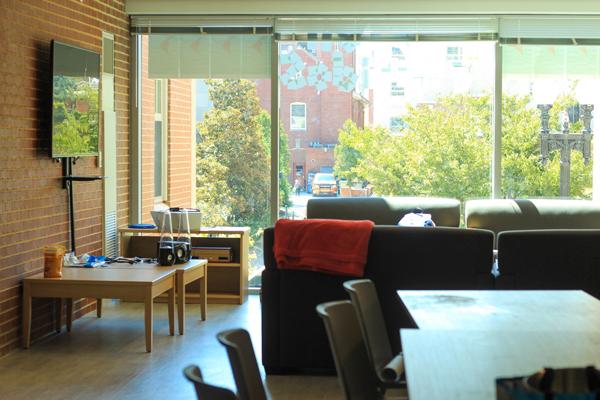Students living in District House have reported University Police Department officers entering affinity common rooms without notice or cause.
Students said they have been told by residence hall staff that affinity common areas are spaces for students living in the affinities and not public spaces patrolled by officers. At least one resident filed formal complaints with the University Police Department about the officers entering the affinities.
University spokeswoman Maralee Csellar said after UPD officers entered at least one of the common spaces, officers have been told to stop going into the common rooms without cause. The department was notified of a “situation” at the beginning of the semester, she said.
“As soon as it was brought to our attention we took immediate action to make sure that it does not occur again,” Csellar said in an email.
But students in the building say they have continued to see the officers in the common spaces as recently as last week — several weeks after area coordinators clarified the status of affinity common rooms as private spaces.
Seneca Anastasio, a junior living in the sustainability affinity FoBoZero in District House, said she has seen officers in her affinity weekly since she moved in.
“I saw a UPD officer come into our common room, look around for a bit and then leave,” Anastasio said.
Anastasio added that officers entered common rooms during gatherings on weekends without knocking.
“Without a knock, all of a sudden I see UPD officers standing next to me in our kitchen, laughing at me and mocking some of the other students,” Anastasio said.
Eve Zhurbinskiy, also a resident of FoBoZero, said in an email that she filed a formal complaint with UPD about officers entering rooms. She said on the first day of classes at around 3:45 a.m., two UPD officers were using the microwave and one “became hostile” when a member of the affinity questioned them.
“The sergeant investigating apologized profusely, stating that this is space for the residents of the affinity and UPD shouldn’t be there to just hang out,” Zhurbinskiy said.
A friend in another affinity entered her common room and found UPD officers watching baseball on the TV, she added.
Zhurbinskiy said she spoke to the area coordinator in the building, who suggested that UPD may not have been told that they should not enter the common areas without cause. She added that was the only time she heard about officers entering the rooms in her particular affinity while students were there.
“I feel uncomfortable by the fact that they’re using space reserved for students who live in the affinity as if it were public space,” Zhurbinskiy said. “It’s the equivalent of UPD randomly entering someone’s room in Thurston to use their microwave.”
At least three students said that they felt more unsafe knowing that UPD could enter the rooms at any time.
Natalie Smith, a sophomore resident of a women’s leadership affinity, said even though they are police officers, it’s still inappropriate for them to enter rooms without reason.
“I understand that they are police officers, but at the end of the day, they still feel like strange men entering our living room unannounced at random hours of the night despite their job description,” Smith said.
Students have gotten mixed messages on whether affinity common spaces are considered public, Smith said. Some resident advisers said the areas are patrolled as public spaces, but area coordinators said they function like most residence halls’ living rooms.
“If I would have known that our common spaces were ‘public’ like we’ve been told, I might not have even joined affinity housing in the first place,” Smith said.







